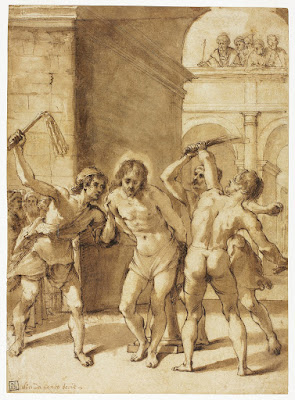 |
| Guercino (Giovanni Francesco Barbieri) Flagellation of Christ 1644 oil on canvas Museum of Fine Arts, Budapest |
"In 1644 the Berengani, a recently ennobled family of merchants active throughout the Veneto, commissioned Guercino to paint an altarpiece of The Flagellation, now in the Museum of Fine Arts, Budapest, for the church of S. Biagio, Vicenza. Living at some distance from Bologna, where Guercino was then resident, the patrons must have insisted on seeing a modello before finalizing the contract. This may account for the beautifully executed, finished drawing [directly below] in the Art Institute of Chicago, wrongly considered a school drawing. As was the painter's wont, he eventually changed almost every single detail from this first idea. He reversed some figures, altered the position of others and, quite rightly, abandoned the massive dark pier at left. Yet despite all these adjustments, he somehow preserved the drawing's overall conception."
 |
| Guercino (Giovanni Francesco Barbieri) Flagellation of Christ 1644 drawing (compositional study) Art Institute of Chicago |
 |
| Guercino (Giovanni Francesco Barbieri) Flagellation of Christ 1644 drawing (compositional study) Ashmolean Museum, Oxford |
 |
| Guercino (Giovanni Francesco Barbieri) St Margaret 1644 oil on canvas Basilica di San Pietro in Vincoli, Rome |
 |
| Guercino (Giovanni Francesco Barbieri) St Margaret (installation view) 1644 oil on canvas Basilica di San Pietro in Vincoli, Rome |
 |
| Richard Cooper the Younger after Guercino St Margaret ca. 1770 copy drawing Scottish National Gallery, Edinburgh |
"The picture [St Margaret] appears over the altar in the right transept of S. Pietro in Vincoli, close to the sacristy door. The padre generale of S. Salvatore, Bologna, a church that had particular resonance for Guercino, commissioned it in 1644. Padre Mirandola, the painter's backer and long-time friend, had given long service to S. Salvatore, and it was there that Guercino was ultimately to be buried. S. Pietro in Vincoli, like S. Salvatore, Bologna, was a church of the Augustinian canons regular of S. Salvatore, otherwise known as the Canonici Renani (from the church of their origin on the banks of the River Reno, which flows near to Cento). The padre generale of S. Salvatore, Bologna, as the head of the order, decided for some reason to make a gesture to one of its subsidiary churches."
 |
| Guercino (Giovanni Francesco Barbieri) Charity 1644 oil on canvas private collection |
 |
| Guercino (Giovanni Francesco Barbieri) Charity 1644 drawing (compositional study) Burrell Collection, Glasgow |
 |
| Guercino (Giovanni Francesco Barbieri) Charity 1644 drawing (compositional study) Musée du Louvre |
"[Guercino's] move to Bologna in 1642 had brought further stylistic changes: the classical tendency that had long been apparent in his work became more marked, and his colours broadened in range, as well as lightened in hue."
 |
| Guercino (Giovanni Francesco Barbieri) Ecce Homo 1644 oil on canvas Palazzo Corsini, Rome |
 |
| Pietro Fontana after Guercino Ecce Homo ca. 1780 engraving Philadelphia Museum of Art |
"[The Ecce Homo] is from the Corsini collection, Rome, and is among the most famous of Guercino's devotional pictures. Numerous copies of varying quality were made from it until the 19th century. . . . It was listed in the Corsini inventory of 1750, with a note saying it was purchased from the heirs of Cardinal Cibo, a reference to Cardinal Alderano Cibo (1613-1700), Papal Legate of Ferrara from 1651 to 1654, when he was well acquainted with Guercino."
 |
| Guercino (Giovanni Francesco Barbieri) St John the Baptist 1644 oil on canvas Pinacoteca Nazionale di Bologna |
"Malvasia noted that this upright oval was commissioned in 1644 by Conte Ettore Ghislieri (1605-76), who was then in the process of building a collection of pictures in his palace, Bologna. . . . The count was a passionate amateur and in 1646 established an academy of painting in his palace, where Guercino taught, along with other Bolognese masters of the day, including Alessandro Tiarini, Francesco Albani [and] Michele Desubleo."
 |
| Guercino (Giovanni Francesco Barbieri) St Michael the Archangel 1644 oil on canvas Chiesa di San Nicolò, Fabriano |
 |
| Guercino (Giovanni Francesco Barbieri) St Michael the Archangel 1644 drawing (compositional study) private collection |
 |
| Guercino (Giovanni Francesco Barbieri) St Michael the Archangel 1644 drawing (compositional study) Art Institute of Chicago |
"The Archangel Michael in the church of S. Nicola, Fabriano, is one of the most elegant of Guercino's later altarpieces. The clarity of its lighting, colour and form is much inspired by Reni's famous altarpiece of the subject in S. Maria della Concezione, Rome, painted in 1635 [directly below]."
 |
| Guido Reni St Michael Archangel 1635 oil on canvas Chiesa di Santa Maria della Concezione, Rome |
– quoted texts from The Paintings of Guercino: a revised and expanded catalogue raisonné by Nicholas Turner (Rome: Ugo Bozzi Editore, 2017)